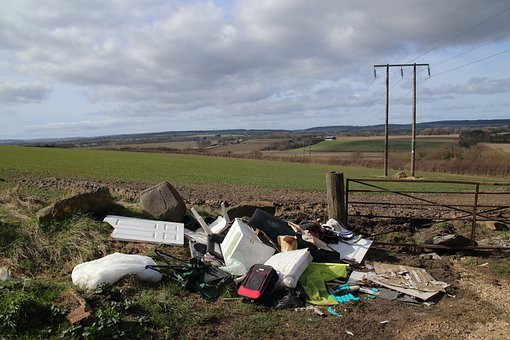Fly-tipping is despised for its vandalism, uncleanliness, and misconduct. But the damages to the environment and wildlife are equally abhorrent. We’re no stranger to images of animals entangled in our waste, with birds wrapped in plastic bags or hedgehogs stuck in beer rings. But the harm of fly-tipping to wildlife is profuse beyond the collaring of small rodents.
In fact, the damages of fly-tipping are numerous. Illegally discarded waste can present many hazards for animals, including sharp objects physically wounding animals and an increased risk of infection from fly-tipped food that can carry bacteria and viruses. These damages should not be just of concern due to their cruel nature, but also because of their consequential effect on our lives.
Something in the water
Fly-tipping can have damaging effects on wildlife in most aspects of their life. Not only does it condemn natural habitats and introduce animals to a dangerous diet of waste food, but it can also poison vital waterways with plastic and chemical pollution.
The erosion of plastic waste in rivers and oceans creates microplastics. Microplastics are small fragments of plastic that pollute the environment. They can be made intentionally small or have been worn to a smaller size after being littered.
If these microplastics are consumed by animals it can have numerable undesirable effects. In some species, it may block their digestive tract, which can lead to starvation. In others, chemicals from the plastic may transfuse into their bloodstream and cause clotting and neurological damage. These pollutants can also be transferred to humans when animals are eaten. One study suggests that humans can consume between 39,000 and 52,000 microplastic particles a year through their lifestyle and diet. With traces of chemicals such as chlorine and lead found in these particles, over time, the consequences of this pollution may be toxic.
A littering pandemic
Diseases can be carried through food. With nearly two-thirds of fly tipping incidents involving household waste, food is likely to be abundant in littering episodes. The dumping of food has consequences for wildlife – it attracts rodents, affects their diets, and can make them susceptible to disease.
This last point is particularly important, especially in the current climate and with the spread of COVID-19. Fly-tipping has been identified as a contributor to this virus. Wasted coffee cups, animals that act as carriers for the virus, and virus particles may be found on a fly-tipping site. Animals may contract diseases from burrowing in waste and licking or eating discarded waste. These diseases have the potential to be passed onto household pets and humans.
Sarah Gilbert, a vaccine professor from Oxford University, expects zoonotic-based infections to increase with our degrading lifestyles. The coronavirus pandemic has only helped to emphasise this point. She believes, “Because of the way things have been going in the world, it’s more likely we’ll have zoonotic infections causing outbreaks in the future.”.
Not only do we have a responsibility to keep our environments safe and clean for other people, but we also owe it to animals and wildlife to continue their natural lives without the obstructions of damaged habitat, changed diets, and an increased risk of disease. Fly-tipping can easily be avoided by hiring waste removal from a trusted source. The consequences of fly-tipping are particularly alarming when considering the transferability of pollution and diseases from animals to humans.



 Bitcoin
Bitcoin  Ethereum
Ethereum  Tether
Tether  XRP
XRP  Solana
Solana  USDC
USDC  TRON
TRON  Lido Staked Ether
Lido Staked Ether  Cardano
Cardano  Avalanche
Avalanche  Toncoin
Toncoin